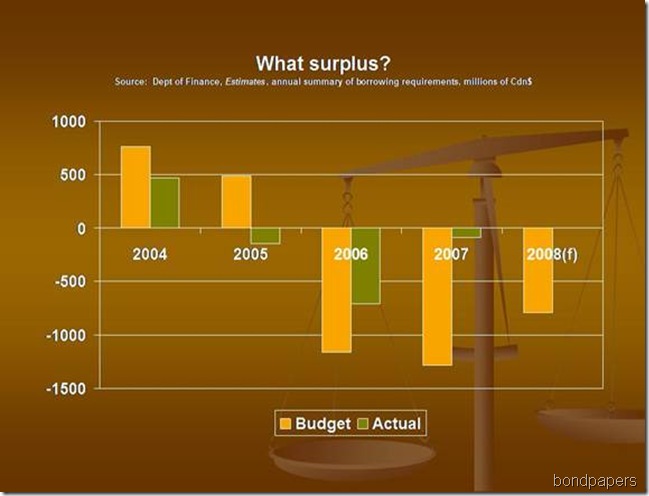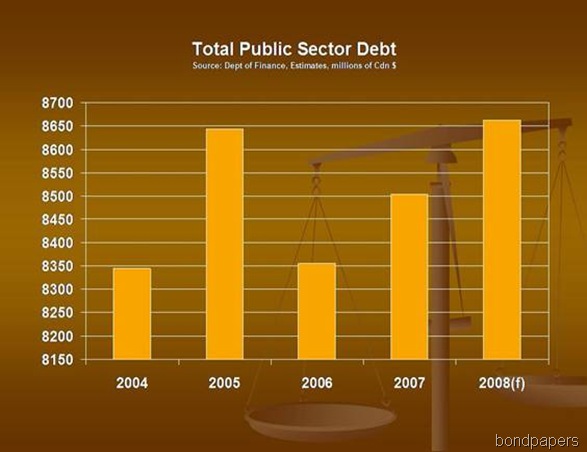The crew that put together's CBC's usually fine "Reality Check" can be forgiven if they missed a few points by a country mile in a summary of the Family Feud.
Forgiveness is easy since the issues involved are complex and - at least on the provincial side since 2003 - there has never been a clear statement of what was going on. Regular Bond Papers readers will be familiar with that. For others, just flip back to the archives for 2005 and the story is laid out there.
Let's see if we can sort through some of the high points here.
With its fragile economy, Newfoundland and Labrador has always depended on money from the federal government. When they struck oil off the coast, the federal government concluded it would not have to continue shelling out as much money to the provincial treasury. N.L.'s oil would save Ottawa money.
Not really.
Newfoundland and Labrador is no different from most provinces in the country, at least as far as Equalization goes. Since 1957 - when the current Equalization program started - the provincial government has received that particular form of federal transfer. So have all the others, at various times, except Ontario. Quebec remains one of the biggest recipients of Equalization cash, if not on a per capita basis than on a total basis. Economic "fragility" has nothing to do with receiving Equalization.
In the dispute over jurisdiction over the offshore, there was never much of a dispute as far as Equalization fundamentally works.
Had Brian Peckford's view prevailed in 1983/1984, Equalization would have worked just as it always has. As soon as the province's own source revenues went beyond the national average, the Equalization transfers would have stopped.
Period.
That didn't work out. Both the Supreme Court of Newfoundland (as it then was called) and in the Supreme Court of Canada, both courts found that jurisdiction over the offshore rested solely with the Government of Canada. All the royalties went with it.
In the 1985 Atlantic Accord, the Brian Mulroney and Brian Peckford governments worked out a joint management deal. Under that agreement - the one that is most important for Newfoundland and Labrador - the provincial government sets and collects royalties as if the oil and gas were on land.
And here's the big thing: the provincial government keeps every single penny. It always has and always will, as long as the 1985 Accord is in force.
As far as Equalization is concerned, both governments agreed that Equalization would work as it always had. When a provincial government makes more money on its own than the national average, the Equalization cash stops.
But...they agreed that for a limited period of time, the provincial government would get a special transfer, based on Equalization that would offset the drop in Equalization that came as oil revenues grew. Not only was the extra cash limited in time, it would also decline such that 12 years after the first oil, there'd be no extra payment.
If the province didn't qualify for Equalization at that point, then that's all there was. If it still fell under the average, then it would get whatever Equalization it was entitled to under the program at the time.
The CBC reality check leaves a huge gap as far as that goes, making it seem as though the whole thing came down to an argument between Danny Williams and Paul Martin and then Danny and Stephen Harper.
Nothing could be further from the truth, to use an overworked phrase.
During negotiations on the Hibernia project, the provincial government realized the formula wouldn't work out as intended. Rather than leave the provincial government with some extra cash, the 1985 deal would actually function just like there was no offset clause. For every dollar of new cash in from oil, the Equalization system would drop Newfoundland's entitlement by 97 cents, net.
The first efforts to raise this issue - by Clyde Wells and energy minister Rex Gibbons in 1990 - were rebuffed by the Mulroney Conservatives. They didn't pussy foot around. John Crosbie accused the provincial government of biting the hand that fed it and of wanting to eat its cake and "vomit it up" as well.
It wasn't until the Liberal victory in 1993 that the first efforts were made to address the problem. Prime Jean Chretien and finance minister Paul Martin amended the Equalization formula to give the provincial government an option of shielding up to 30% of its oil revenue from Equalization calculations. That option wasn't time limited and for the 12 years in which the 1985 deal allowed for offsets the provincial government could always have the chance to pick the option that gave the most cash. It only picked the wrong option once.
The Equalization issue remained a cause celebre, especially for those who had been involved in the original negotiations. It resurfaced in the a 2003 provincial government royal commission study which introduced the idea of a clawback into the vocabulary. The presentation in the commission reported grossly distorted the reality and the history involved. Some charts that purported to show the financial issues bordered on fraud.
Danny Williams took up the issue in 2004 with the Martin administration and fought a pitched battle - largely in public - over the issue. He gave a taste of his anti-Ottawa rhetoric in a 2001 speech to Nova Scotia Tories. Little in the way of formal correspondence appears to have been exchanged throughout the early part of 2004. Up to the fall of 2004 - when detailed discussions started - the provincial government offered three different versions of what it was looking for. None matched the final agreement.
The CBC "Reality Check" describes the 2005 agreement this way:
The agreement was that the calculation of equalization payments to Newfoundland and Labrador would not include oil revenue. As the saying goes, oil revenues would not be clawed back. Martin agreed and then-opposition leader Harper also agreed.
Simply put, that's dead wrong.
The 2005 deal provided for another type of transfer to Newfoundland and Labrador from Ottawa on top of the 1985 offset payment. The Equalization program was not changed in any way. Until the substantive changes to Equalization under Stephen Harper 100% of oil revenues was included to calculate Equalization entitlements. That's exactly what Danny Williams stated as provincial government policy in January 2006, incidentally. The Harper changes hid 50% of all non-renewable resource revenues from Equalization (oil and mining) and imposed a cap on total transfers.
As for the revenues being "clawed back", one of the key terms of the 2005 deal is that the whole thing operates based on the Equalization formula that is in place at any given time. Oil revenues are treated like gas taxes, income tax, sales tax, motor vehicle registration and any other type of provincial own-source revenue, just like they have been as long as Equalization has been around.
What the federal Conservatives proposed in 2004 and 2006 as a part of their campaign platform - not just in a letter to Danny Williams - was to let all provinces hide their revenues from oil, gas and other non-renewable resources from the Equalization calculations. The offer didn't apply just to one province. Had it been implemented, it would have applied to all.
That was clear enough until the Harper government produced its budget 18 months ago. What was clear on budget day became a bit murky a few days later when Wade Locke of Memorial University of Newfoundland began to take a hard look at the numbers.
Again, that's pretty much dead wrong.
It became clear shortly after Harper took office in 2006 that the 100% exclusion idea from the 2004 and 2006 campaigns would be abandoned in favour of something else. There was nothing murky about it at all. So plain was the problem that at least one local newspaper reported on a fracas at the Provincial Conservative convention in October 2006 supposedly involving the Premier's brother and the Conservative party's national president. That's when the Family Feud started.
As for the 2007 budget bills which amended both the 1985 and 2005 agreements between Ottawa and St. John's, there's a serious question as to whether the provincial government actually consented to the amendments as required under the 1985 Atlantic Accord.
The story about Equalization is a long one and the Family Feud - a.k.a the ABC campaign - has a complex history. There's no shame in missing some points. It's just so unusual that CBC's "Reality Check" was so widely off base.
-srbp-
 Only two short years ago, Provincial Conservatives were lining up to get their picture taken with a Conservative brother running for re-election for what turned out to be the last time.
Only two short years ago, Provincial Conservatives were lining up to get their picture taken with a Conservative brother running for re-election for what turned out to be the last time.
 But that isn't the official budget of the provincial government approved in the House of Assembly any more than all the talk by politicians about surpluses the past few years was accurate either.
But that isn't the official budget of the provincial government approved in the House of Assembly any more than all the talk by politicians about surpluses the past few years was accurate either. At the same time, very little attention has been paid to paying down the large amount of debt - the accumulated deficits - that now runs upwards of $8.5 billion and is expected to climb higher this year.
At the same time, very little attention has been paid to paying down the large amount of debt - the accumulated deficits - that now runs upwards of $8.5 billion and is expected to climb higher this year.